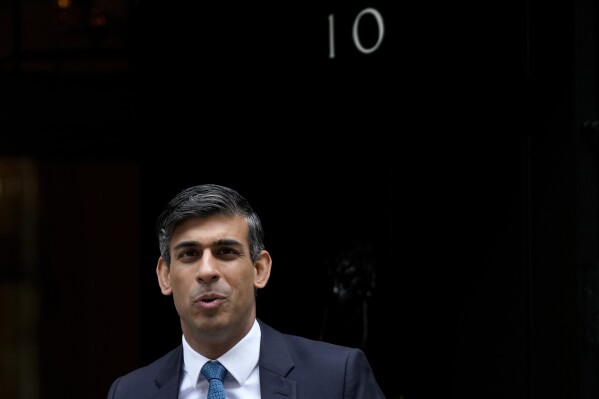UK government lifts de facto ban on onshore wind farms
LONDON (AP) — Britain’s Conservative government relaxed planning rules Tuesday and lifted restrictions that effectively banned the building of new onshore wind farms in England.
Rules introduced in 2015 by then-Prime Minister David Cameron, who also led a Conservative administration, allowed a single objection to a wind turbine application to block its development. The regulations led to a dramatic decline in the number of new turbines granted planning permission.
Some Conservatives pressured the current government to overturn the rules. Lawmaker Alok Sharma, who was president of the 2021 U.N. climate change conference and led the lobbying campaign, called them “outdated” and “not a sensible way for a planning system to operate.”
Authorities said Tuesday that the eased restrictions mean that onshore wind projects supported by local residents will get approved more quickly. They said elected local officials will have the ability to make final decisions based on the prevailing view of their communities, not just a small number of objectors.
 Summer’s over for UK politicians as Sunak faces a crisis over crumbling schools
Summer’s over for UK politicians as Sunak faces a crisis over crumbling schools
 Messi has 2 assists in front of star-studded crowd in Los Angeles as Inter Miami beats LAFC 3-1
Messi has 2 assists in front of star-studded crowd in Los Angeles as Inter Miami beats LAFC 3-1
 Sargent carries USA to Sunday rally and Walker Cup win at St. Andrews
Sargent carries USA to Sunday rally and Walker Cup win at St. Andrews
Communities that back wind turbines in their areas will also benefit from cheaper electricity, officials said, adding that the way such energy discounts work would be considered later.
Environmental groups said Tuesday’s decision, which took immediate effect, was overly cautious and that too many obstacles to building wind turbines in England still exist. Greenpeace called the changes “feeble tweaks” and “just more hot air from the government.”
“Today’s small step forward leaves new onshore wind in England still facing higher planning barriers than anything else, including new coal mines, and it will still be too difficult for communities which want wind to get it,” Alethea Warrington, the senior campaigner at climate advocacy group Possible, said.
Renewable energy made up 42% of the U.K.’s electricity generation last year. Much of it came from offshore wind farms. Experts have warned that onshore wind energy production must be scaled up rapidly for the U.K. to meet its climate change goals.
Britain’s government has pledged to reduce greenhouse gas emissions by 68% by 2030, eventually reaching net-zero — or releasing only as much greenhouse gas as can be absorbed again through natural or technological means — by 2050.
___
Follow AP’s coverage of climate issues and the environment: https://apnews.com/climate-and-environment
Disclaimer: The copyright of this article belongs to the original author. Reposting this article is solely for the purpose of information dissemination and does not constitute any investment advice. If there is any infringement, please contact us immediately. We will make corrections or deletions as necessary. Thank you.







